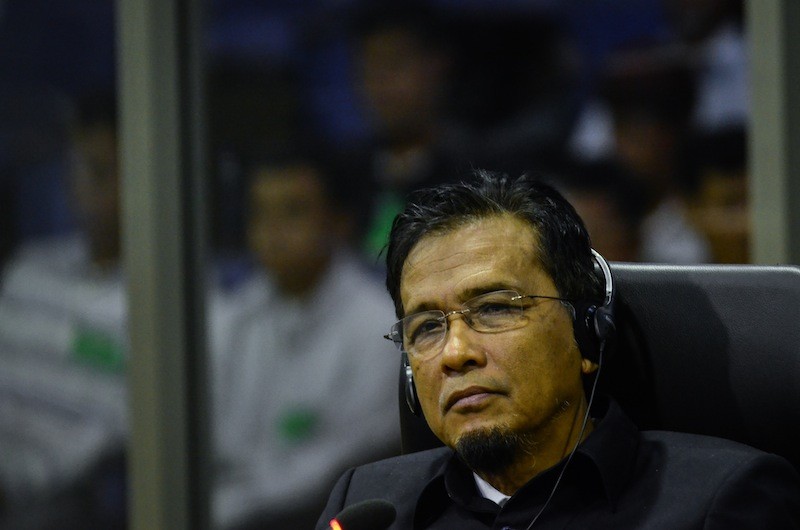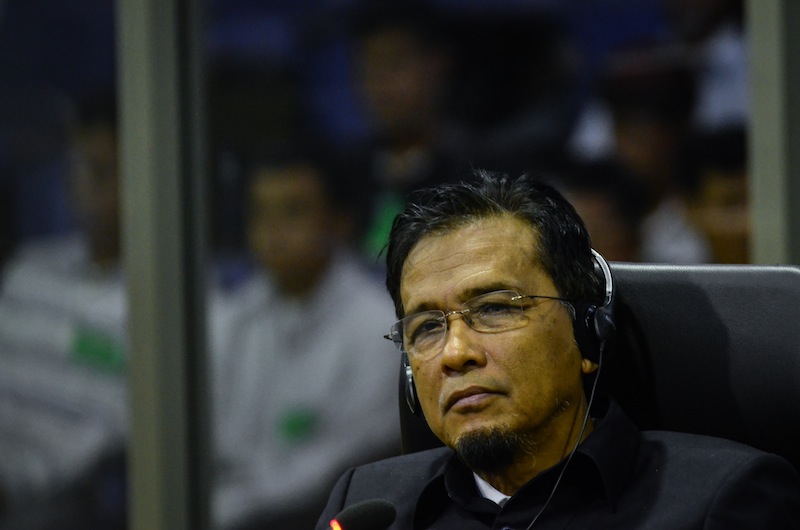After repeatedly refusing to testify before the Khmer Rouge tribunal—prompting judges to contact judicial police—the head of the Council for Islamic Religious Affairs in Cambodia finally took the stand yesterday, only to be grilled about his absence.
Sos Kamry, who holds the title of “oknha,” an honorific generally reserved for wealthy businessmen with close ties to the ruling CPP, has refused to appear at the Extraordinary Chambers in the Courts of Cambodia (ECCC) since first being summoned in September, citing health reasons.

The religious leader eventually agreed to testify last month after the Trial Chamber threatened to have him brought to the court by force, but backtracked on Sunday—the eve of his scheduled appearance—saying he had changed his mind.
When Mr. Kamry failed to appear for a second day on Tuesday, Trial Chamber President Nil Nonn sent a letter to Lor Soleng, the tribunal’s judicial police liaison, requesting an explanation for why the witness had not shown up.
On Wednesday, Mr. Kamry took the stand to testify about the treatment of Cham Muslims during the Pol Pot era. He recounted seeing Cham bodies piled up in Kompong Cham province and said he had read a booklet outlining a Khmer Rouge policy to wipe out the religious group.
A letter from Major General Soleng received by the court on Wednesday said Mr. Kamry had only agreed to appear after being persuaded by other members of the Islamic council and as judicial police prepared to bring him to the court by force.
“The National Security Section and the Judicial Police Officers were prepared to execute the Order in cooperation with the local police and the ECCC’s Witness and Expert Support Unit, settling the time and identifying the location for execution at 7:00 a.m. [on Tuesday],” Maj. Gen. Soleng wrote.
The police official said he had then received an “urgent request” from the Islamic council that it be given time to convince Mr. Kamry to appear of his own volition, claiming that a forced appearance “would mislead Muslim Cambodians and might lead to various protests and violence.”
In court on Wednesday, Victor Koppe, a defense lawyer for Khmer Rouge second-in-command Nuon Chea—who is on trial for crimes including genocide alongside Khieu Samphan, the regime’s head of state—grilled the witness on why he had been so reluctant to testify.
When Mr. Kamry replied that only his poor health had prevented him from turning up, Mr. Koppe pointed to the concerns raised by the Islamic council.
“Are you aware of communications between the Council for Islamic Religious Affairs—for which you are president—to the court [arguing] that forcing your appearance would lead to protests and violence within the Cham community?” the lawyer asked.
“That is the correct statement,” Mr. Kamry replied, before reversing course and again claiming that his absence was health-related.
Mr. Koppe then cited a request made by Osman Hassan, a Cham Muslim and secretary of state at the Labor Ministry, calling for the court to have Mr. Kamry replaced as a witness.
“Who is His Excellency Osman Hassan, adviser to Prime Minister Hun Sen? Who is he and do you know him?” the lawyer asked.
“Please…do not ask me about the issue of others,” the witness replied.
“Do you know whether Osman Hassan asked on your behalf whether you, as a witness, could be replaced by someone else to testify?” Mr. Koppe then asked, to which Mr. Kamry responded by once again complaining of his poor health.
Contacted by telephone on Wednesday, Mr. Hassan said he had never contacted the court, but that he nonetheless believed Mr. Kamry should not have been forced to testify.
“I think there are people that could have replaced him; there are a lot of people who lived through [the Khmer Rouge era],” he said.
Later in the day, Mr. Koppe asked Mr. Kamry why he had refused to swear under oath, and said this suggested he was lying about reading a 16-page booklet in 1977 that stated that the Cham would be eliminated by 1980.
“Let me ask you the very concrete [question] and please don’t be offended when I ask the question: The fact you’re not taking an oath, is that because of this particular answer, that in fact you didn’t actually see that little book, but you are afraid to say so under oath?” he asked.
Mr. Kamry, who had previously explained that he was not required to swear under oath according to Islamic law, refuted the accusation.
“Here, I don’t think we need to use the word afraid because we are talking about the truth. I only say about what I saw, what I heard of, and besides that I do not know what else I can tell you in [my] capacity as a religious follower,” he said.
Mr. Kamry was then asked about an earlier statement he had made to investigators, explaining how the Khmer Rouge slaughtered Cham Muslims who participated in 1975 revolts in Kompong Cham province’s Koh Phal village and Tbong Khmum province’s Svay Khleang village.
In court, however, the witness claimed he had little knowledge of the massacre and did not wish to discuss it.
According to a recent Human Rights Watch report, Khmer Rouge units under the command of Prime Minister Hun Sen, National Assembly President Heng Samrin and CPP Senator Ouk Bunchhoeun were involved in suppressing the uprisings.
“Have you ever heard of involvement of people who are presently in the government in relation to the crushing of this rebellion?” Mr. Koppe asked.
“I have never heard of it,” the witness replied.
(Additional reporting by Ouch Sony)




